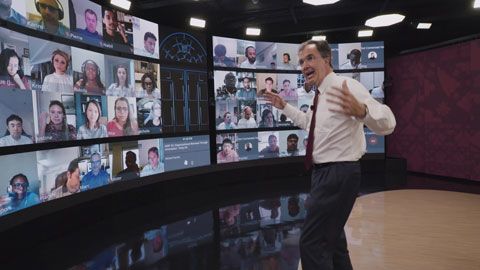Risk Management for Corporate Leaders—Virtual
- Dates: 02–12 DEC 2024
- Format: Virtual Synchronous learning at designated live online session times.
- Fee: $8,500
The program fee covers tuition, e-books, and online case materials.
Application Due: 22 NOV 2024

"I was amazed by the quality of the instructors, the depth of the case studies, and the breadth of the concepts."

Turning unexpected risks into new business opportunities.
Summary
All organizations—even those with sophisticated models of risk exposure—are vulnerable to disaster. In most organizations, risk management attempts to avoid disasters by emphasizing compliance, internal controls, and conformance to standard operating procedures. This live online program takes a more comprehensive and strategic view of risk management. It provides frameworks and tools for senior leadership and corporate boards to strengthen your company's approach to managing both internal and external risks. You will return from this virtual program ready to develop and implement innovative strategies by better identification and mitigation of the attendant risks.
This program is eligible for the Certificate of Management Excellence. Learn More
-
Summary
-
All organizations—even those with sophisticated models of risk exposure—are vulnerable to disaster. In most organizations, risk management attempts to avoid disasters by emphasizing compliance, internal controls, and conformance to standard operating procedures. This live online program takes a more comprehensive and strategic view of risk management. It provides frameworks and tools for senior leadership and corporate boards to strengthen your company's approach to managing both internal and external risks. You will return from this virtual program ready to develop and implement innovative strategies by better identification and mitigation of the attendant risks.

This program is eligible for the Certificate of Management Excellence. Learn More
DetailsExpand AllCollapse All
Anticipate and mitigate different types of riskAnticipate and mitigate different types of risk
- Assess your company's potential risks, such as operations and competitive threats, brand damage, cyber-attacks, and unexpected global events
- Know when to turn down opportunities that could expose your company to excessive risk
- Use the three levels of risk hierarchy to build and integrate processes that anticipate, prioritize, and mitigate threats
- Learn how to overcome individual and organizational barriers to effective risk discussions and risk mitigation actions
- Establish a crisis incident management team that can be rapidly mobilized to manage unforeseen external events
Transform risk into competitive advantageTransform risk into competitive advantage
- Integrate risk management into strategy formulation and execution
- Decide which threats to manage and mitigate internally as a source of competitive advantage
- Sustain operations during crisis situations
- Create long-term opportunities from short-term risks
Attend with your teamAttend with your team
- Conduct daily debriefs among participating team members to reflect after each session
- Participate as a group in a comprehensive immersive learning experience without removing key people for an extended period of time from work related activities
- Develop an action and implementation plan and engage as a team in a post-program session with an HBS teaching leader
Expand your personal and professional networkExpand your personal and professional network
- Extend your network by connecting and working with accomplished executives from various backgrounds, industries, and countries across the globe
- Build relationships with a diverse group of peers who can provide wide-ranging insights into your business challenges and career decisions
Anticipate and mitigate different types of risk
- Assess your company's potential risks, such as operations and competitive threats, brand damage, cyber-attacks, and unexpected global events
- Know when to turn down opportunities that could expose your company to excessive risk
- Use the three levels of risk hierarchy to build and integrate processes that anticipate, prioritize, and mitigate threats
- Learn how to overcome individual and organizational barriers to effective risk discussions and risk mitigation actions
- Establish a crisis incident management team that can be rapidly mobilized to manage unforeseen external events
Transform risk into competitive advantage
- Integrate risk management into strategy formulation and execution
- Decide which threats to manage and mitigate internally as a source of competitive advantage
- Sustain operations during crisis situations
- Create long-term opportunities from short-term risks
Attend with your team
- Conduct daily debriefs among participating team members to reflect after each session
- Participate as a group in a comprehensive immersive learning experience without removing key people for an extended period of time from work related activities
- Develop an action and implementation plan and engage as a team in a post-program session with an HBS teaching leader
Expand your personal and professional network
- Extend your network by connecting and working with accomplished executives from various backgrounds, industries, and countries across the globe
- Build relationships with a diverse group of peers who can provide wide-ranging insights into your business challenges and career decisions
Who Should Attend
Senior business leaders in large established companies who have significant corporate management responsibilities, including:
- Chief risk officers and other leaders in risk management roles
- Crisis management team leaders
- Chief financial officers
- Board members
- General managers, including CEOs, COOs, and division heads
- Senior leaders responsible for executing and controlling strategy
- Public relations executives
Attendance by multiple company representatives will foster teamwork and amplify the program's impact, particularly in the context of risk management requiring active collaboration between a staff function (the risk management office or group), line management, and a board. This program is designed to enable team members to actively participate in a comprehensive, immersive learning experience without removing key people for an extended time from all work-related activities.
Senior business leaders in large established companies who have significant corporate management responsibilities, including:
- Chief risk officers and other leaders in risk management roles
- Crisis management team leaders
- Chief financial officers
- Board members
- General managers, including CEOs, COOs, and division heads
- Senior leaders responsible for executing and controlling strategy
- Public relations executives
Attendance by multiple company representatives will foster teamwork and amplify the program's impact, particularly in the context of risk management requiring active collaboration between a staff function (the risk management office or group), line management, and a board. This program is designed to enable team members to actively participate in a comprehensive, immersive learning experience without removing key people for an extended time from all work-related activities.
Leaders in Virtual Learning
This program features sessions in the HBS Live Online Classroom.
Just as HBS pioneered the case study method, we also built the first live online classroom in 2014 and have been refining and optimizing our virtual program experience ever since. In a world that is now centered around virtual connection, our programs reflect the input and experience of tens of thousands of participants.
When you participate in a virtual HBS Executive Education program, you benefit from a powerful learning experience carefully designed with a virtual setting in mind. Through live, synchronous program sessions you'll engage directly with our renowned faculty to learn from their latest research, gain actionable takeaways, and facilitate your growth. In addition, virtual discussion groups will connect you to a global group of peers and build your network.
-
Leaders in Virtual Learning
-
This program features sessions in the HBS Live Online Classroom.
Just as HBS pioneered the case study method, we also built the first live online classroom in 2014 and have been refining and optimizing our virtual program experience ever since. In a world that is now centered around virtual connection, our programs reflect the input and experience of tens of thousands of participants.
When you participate in a virtual HBS Executive Education program, you benefit from a powerful learning experience carefully designed with a virtual setting in mind. Through live, synchronous program sessions you'll engage directly with our renowned faculty to learn from their latest research, gain actionable takeaways, and facilitate your growth. In addition, virtual discussion groups will connect you to a global group of peers and build your network.
Admissions Criteria and Process
Answering Your Questions
Application Submission
Application Review
Fee, Payment, and Cancellations
Answering Your Questions
Application Submission
Application Review
Fee, Payment, and Cancellations
What You Will Learn
This virtual program immerses you in dynamic case studies, scenario planning, and wargaming exercises, as you explore how public, private, and nonprofit organizations are driving and preserving enterprise value. You will return to your company with a personal Key Risk Indicator scorecard that incorporates risk into strategy execution—and with the frameworks to turn short-range risks into long-term opportunities.
-
What You Will Learn
-
This virtual program immerses you in dynamic case studies, scenario planning, and wargaming exercises, as you explore how public, private, and nonprofit organizations are driving and preserving enterprise value. You will return to your company with a personal Key Risk Indicator scorecard that incorporates risk into strategy execution—and with the frameworks to turn short-range risks into long-term opportunities.
Program Format
The program takes place over two weeks, with live, synchronous classes from 8:15 AM to 2:05 PM ET, including time for discussion groups. Participants should expect to spend at least 9-12 hours on self-paced case preparation prior to attending the program. Case materials will be made available approximately two weeks prior to program start.
Collaborative learning is an integral part of the experience. To maximize the benefit for everyone, you are expected to attend every session, complete all assignments, and contribute effectively in the class and in small groups.
Teams taking the program together will conduct daily de-briefing calls among participating members to discuss their learnings and how those may be applied within their organization. In addition, teams of four or more will be invited to engage in a post-program session with an HBS teaching leader within 90 days of the course's completion. They will have the option to invite managers, executives, and/or board members who did not attend the program. The timing enables participating teams to develop an action and implementation plan to discuss. Alternatively, teams can invite a larger group of their colleagues to attend a one-hour workshop to collect feedback on an implementation proposal, receive a presentation based on one of the sessions from the course, or participate in an interactive discussion about key concepts covered in the course.
-
Program Format
-
The program takes place over two weeks, with live, synchronous classes from 8:15 AM to 2:05 PM ET, including time for discussion groups. Participants should expect to spend at least 9-12 hours on self-paced case preparation prior to attending the program. Case materials will be made available approximately two weeks prior to program start.
Collaborative learning is an integral part of the experience. To maximize the benefit for everyone, you are expected to attend every session, complete all assignments, and contribute effectively in the class and in small groups.
Teams taking the program together will conduct daily de-briefing calls among participating members to discuss their learnings and how those may be applied within their organization. In addition, teams of four or more will be invited to engage in a post-program session with an HBS teaching leader within 90 days of the course's completion. They will have the option to invite managers, executives, and/or board members who did not attend the program. The timing enables participating teams to develop an action and implementation plan to discuss. Alternatively, teams can invite a larger group of their colleagues to attend a one-hour workshop to collect feedback on an implementation proposal, receive a presentation based on one of the sessions from the course, or participate in an interactive discussion about key concepts covered in the course.
Key TopicsExpand AllCollapse All
Linking risk management to strategy formulation and executionLinking risk management to strategy formulation and execution
- Installing and operating an enterprise risk management system
- Identifying key risk events that could derail your strategy
- Assessing and mitigating the most likely and consequential risks your company faces
- Selecting the risks that your firm has a comparative advantage in retaining
- Implementing and monitoring risk mitigation initiatives
- Selecting strategies that are adaptable and robust for multiple states of the world
Managing the risks from uncontrollable external eventsManaging the risks from uncontrollable external events
- Recognizing and managing supply chain risks in an interconnected world
- Identifying risks that the enterprise should insure or hedge against
- Estimating the likelihood and consequences of sudden events with "heat" maps
- Using scenario analysis and wargaming to anticipate and plan for external risks
- Responding to risk events caused by macroeconomic and political disruptions, natural disasters, and global pandemics
Responding to reputational and brand risksResponding to reputational and brand risks
- Dealing with unfavorable feedback from the media and other constituents
- Responding to unexpected data about your operations, products, and services
- Understanding the difference between risk management and crisis management
- Recognizing the potential causes and consequences of a data breach
- Identifying board directors' roles and responsibilities for cybersecurity
Organizing, managing, and governing the risk management functionOrganizing, managing, and governing the risk management function
- Deciding on the appropriate level of authority for your risk management function
- Setting priorities and establishing funding for risk mitigation initiatives
- Embedding risk management in your organizational reporting structure
Maintaining the creative tension between innovation and risk managementMaintaining the creative tension between innovation and risk management
- Anticipating the risks inherent in a high-innovation strategy
- Balancing the rewards from innovative ventures with the risks from unexpected events
- Recognizing and avoiding how "bad things can happen to innovative strategies"
Linking risk management to strategy formulation and execution
- Installing and operating an enterprise risk management system
- Identifying key risk events that could derail your strategy
- Assessing and mitigating the most likely and consequential risks your company faces
- Selecting the risks that your firm has a comparative advantage in retaining
- Implementing and monitoring risk mitigation initiatives
- Selecting strategies that are adaptable and robust for multiple states of the world
Managing the risks from uncontrollable external events
- Recognizing and managing supply chain risks in an interconnected world
- Identifying risks that the enterprise should insure or hedge against
- Estimating the likelihood and consequences of sudden events with "heat" maps
- Using scenario analysis and wargaming to anticipate and plan for external risks
- Responding to risk events caused by macroeconomic and political disruptions, natural disasters, and global pandemics
Responding to reputational and brand risks
- Dealing with unfavorable feedback from the media and other constituents
- Responding to unexpected data about your operations, products, and services
- Understanding the difference between risk management and crisis management
- Recognizing the potential causes and consequences of a data breach
- Identifying board directors' roles and responsibilities for cybersecurity
Organizing, managing, and governing the risk management function
- Deciding on the appropriate level of authority for your risk management function
- Setting priorities and establishing funding for risk mitigation initiatives
- Embedding risk management in your organizational reporting structure
Maintaining the creative tension between innovation and risk management
- Anticipating the risks inherent in a high-innovation strategy
- Balancing the rewards from innovative ventures with the risks from unexpected events
- Recognizing and avoiding how "bad things can happen to innovative strategies"
The HBS Advantage
Our Executive Education programs are developed and taught by HBS faculty who are widely recognized as skilled educators, groundbreaking researchers, and award-winning authors. Through their board memberships, consulting, and field-based research, they address the complex challenges facing business leaders across the globe.
Senior Fellow, Marvin Bower Professor of Leadership Development, Emeritus
Eliot I. Snider and Family Baker Foundation Professor and Professor of Business Administration, Emeritus
George F. Baker, Jr. Professor of Public Management
Novartis Professor of Leadership and Management
UPS Foundation Professor of Business Logistics
Baker Foundation Professor, Charles M. Williams Professor of Business Administration, Emeritus
McLean Family Professor of Business Administration
Philip J. Stomberg Professor of Business Administration
-
The HBS Advantage
-
Our Executive Education programs are developed and taught by HBS faculty who are widely recognized as skilled educators, groundbreaking researchers, and award-winning authors. Through their board memberships, consulting, and field-based research, they address the complex challenges facing business leaders across the globe.
Faculty CochairsSenior Fellow, Marvin Bower Professor of Leadership Development, Emeritus
HBS Unit:Accounting and ManagementHarvard Business School:Eliot I. Snider and Family Baker Foundation Professor and Professor of Business Administration, Emeritus
Harvard Kennedy School:George F. Baker, Jr. Professor of Public Management
HBS Unit:General ManagementFacultyNovartis Professor of Leadership and Management
HBS Unit:Technology and Operations ManagementUPS Foundation Professor of Business Logistics
HBS Unit:Technology and Operations ManagementBaker Foundation Professor, Charles M. Williams Professor of Business Administration, Emeritus
HBS Unit:Accounting and ManagementMcLean Family Professor of Business Administration
HBS Unit:Accounting and ManagementPhilip J. Stomberg Professor of Business Administration
HBS Unit:Accounting and Management
Your Peers Expand Your Learning
-
Your Peers Expand Your Learning
-
Global PerspectiveExperience the world in your classroomGlobal PerspectiveExperience the world in your classroom7%Africa13%Asia Pacific12%Europe9%Latin America13%Middle East46%North America7%Africa13%Asia Pacific12%Europe9%Latin America13%Middle East46%North AmericaTop Industries RepresentedInsights from a range of industries ignite your thinking.Insights from a range of industries ignite your thinking.26%Financial15%Nonprofit Services10%Professional Services8%High Technology5%Consumer Products5%Utilities / Telecom4%Chem / Pharma / Bio4%Health Care4%Raw Materials / Energy3%EducationTop Industries RepresentedInsights from a range of industries ignite your thinking.26%Financial15%Nonprofit Services10%Professional Services8%High Technology5%Consumer Products5%Utilities / Telecom4%Chem / Pharma / Bio4%Health Care4%Raw Materials / Energy3%EducationExperienceExperienceYears WorkedYears WorkedExperienceYears WorkedLess than 10 yearsLess than 10 years10-14 years10-14 years15-19 years15-19 years20-24 years20-24 years25-29 years25-29 years30-34 years30-34 years35-39 years35-39 yearsLess than 10 yearsLess than 10 years10-14 years10-14 years15-19 years15-19 years20-24 years20-24 years25-29 years25-29 years30-34 years30-34 years35-39 years35-39 years

"I was amazed by the quality of the instructors, the depth of the case studies, and the breadth of the concepts."



























